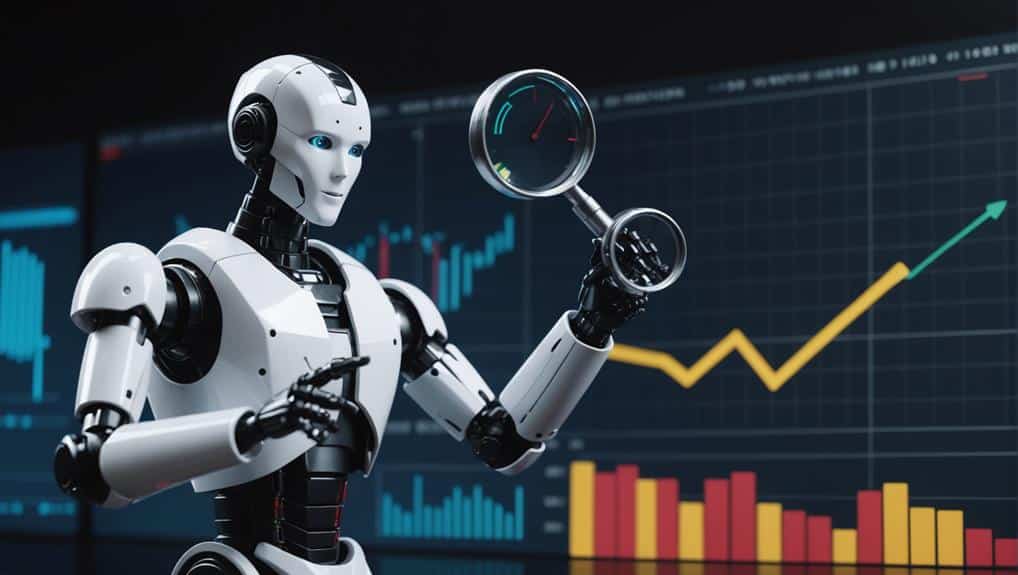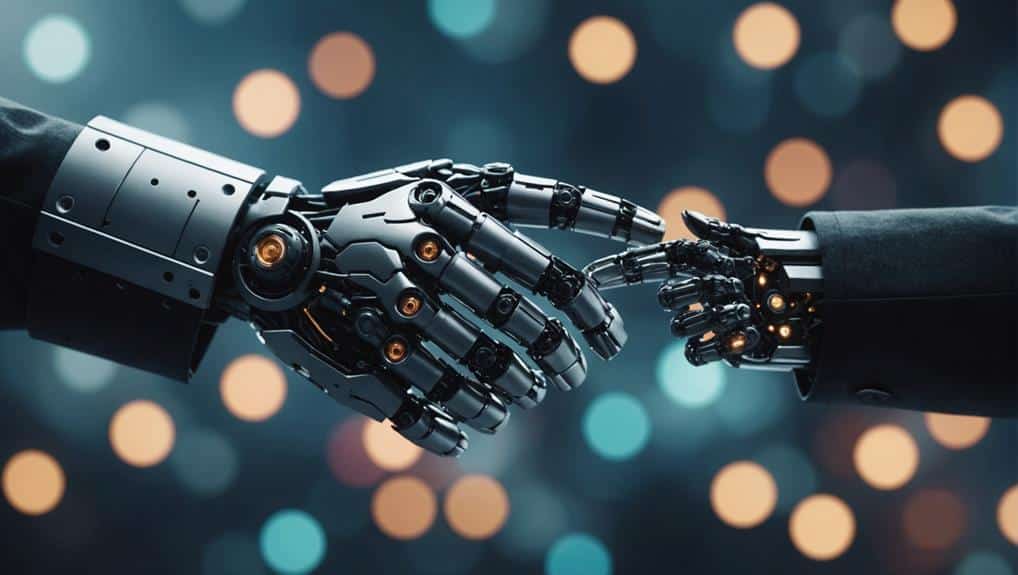AI-powered tools are reshaping organizational performance, offering myriad benefits that propel success. With their multifaceted applications, these tools streamline operations and yield insights to drive strategic decision-making. This discussion will explore six benefits of AI-assisted tools, from tailored learning to predictive attrition analytics. By appreciating these advantages, we can better comprehend the transformative potential of AI in the corporate world, setting the stage for an intriguing exploration of its current and future impact.
Key Takeaways
- AI-assisted tools offer tailored learning programs, enhancing skill development and career growth.
- They provide data-driven performance assessments, predicting turnover risks and improving employee engagement.
- AI tools can streamline career mobility through customized learning experiences and analysis of internal mobility opportunities.
- Predictive attrition analytics with AI help to understand employee sentiments and create proactive retention strategies.
AI-Powered Success for Your Business
While traditional learning methods can often be generalized and impersonal, AI offers tailored learning programs that align with distinct skills, preferences, and professional goals. AI’s power lies in its ability to deliver customized learning experiences that accommodate the needs of each individual, fostering a sense of belonging and engagement.
AI coaches play a pivotal role in this shift. They guide employees through a tailored learning journey, offering real-time progress tracking and data-driven insights that pinpoint areas of strength and highlight avenues for personalized skill development. The result is accelerated career growth fueled by learning experiences that resonate on a distinct level.
Moreover, centralized knowledge repositories provided by AI streamline access to a wealth of training materials. This convenience promotes continual employee development and fosters a learning culture within the organization. AI’s recognition of employees’ efforts goes a long way in boosting morale and engagement levels.
Performance Management Through AI

Performance management enters a new era with the integration of AI, opening pathways for substantial improvements in employee evaluations and training. Leveraging AI’s analytical capabilities, organizations can refine their appraisal methods, making them more objective, tailored, and bias-free. Moreover, AI’s role in enhancing training procedures, from speeding up the process to providing tailored learning paths, optimizes individual growth and overall operational efficiency.
AI-Driven Employee Evaluations
Harnessing AI’s power, companies can automate employee evaluations, providing feedback based on goal completion and objective assessments, thereby minimizing potential biases inherent in person-led evaluations. AI-driven employee evaluations automate feedback generation and offer live progress tracking, giving managers and employees a clear and immediate view of performance.
- AI in performance management transforms traditional, often subjective, assessment methods into data-driven processes. This minimizes bias and promotes fair, objective evaluations, fostering a sense of belonging and fairness among employees.
- AI coaches have emerged as tailored guides in skill development and career growth. By aligning training with professional goals, these AI-powered tools create a supportive environment for talent development, further enhancing employee retention.
- Leveraging predictive analytics, AI can identify potential turnover risks early, allowing companies to craft targeted retention initiatives. This proactive approach guarantees that valued employees feel recognized and engaged, contributing to a stronger and more cohesive workforce.
Enhancing Training With AI
By integrating artificial intelligence in performance management, customized learning programs are now designed to cater to distinct skill sets and preferences, revolutionizing training methods and contributing significantly to employee development. AI’s ability to provide live progress tracking fosters continual learning, offering data-driven insights that pinpoint specific strengths, weaknesses, and interests for targeted skill enhancement.
AI’s functionality extends to automated, impartial feedback generation based on goal completion. This promotes career growth by providing actionable recommendations for employees’ growth areas. Moreover, AI coaches guide employees through this journey, transforming the learning environment into a nurturing ground for advancement.
Centralized knowledge repositories, supported by AI, are another critical tool for enhancing employee engagement. These repositories provide easy access to training materials, creating an inclusive, accessible learning community.
| AI in Performance Management | Benefits | Outcomes |
|---|---|---|
| Tailored Learning Programs | Customized Training | Skill Development |
| Live Progress Tracking | Targeted Learning | Career Growth |
| Automated Feedback Generation | Impartial Evaluation | Employee Engagement |
| AI Coaches | Continuous Guidance | Skill Enhancement |
| Centralized Knowledge Repositories | Accessible Learning Materials | Employee Engagement |
AI in performance management potentiates employee growth and engagement, fostering a positive and productive work environment.
AI in Career Development

AI’s application in career development has opened new avenues in customized learning, employee mobility, and predictive attrition analytics. It enables the creation of tailored learning programs, aligns employees with suitable job roles based on their data, and uses predictive analytics to tackle turnover risks. In this scenario, we will explore how AI revolutionizes career development strategies within organizations.
Personalized Learning Programs
Customized learning programs powered by Artificial Intelligence (AI) are emerging as transformative tools in career development. These programs meticulously align training initiatives with distinct skills, preferences, and professional aspirations. These personalized learning programs promote skill development and career growth, utilizing AI coaches to guide employees professionally.
- Instant progress tracking is a crucial feature, providing data-driven insights that identify strengths, weaknesses, and areas for enhancement. This allows for a more targeted approach to learning and development, leading to increased engagement and productivity.
- Centralized knowledge repositories act as a one-stop-shop for training materials, facilitating easy access and supporting continuous development. This guarantees that employees are always equipped with the necessary resources to enhance their skills.
- The integration of AI into these programs also boosts engagement. When employees feel that their learning experiences are tailored to their individual needs and aspirations, they are more likely to engage with the materials and apply what they’ve learned to their work, driving their growth and success.
AI for Internal Mobility
Harnessing the power of Artificial Intelligence for internal mobility, organizations can analyze employee data to match them with suitable job postings, thereby enhancing career development opportunities. AI algorithms perform deep data analysis to facilitate these matches, offering employees personalized trajectories for their career growth.
Internal mobility is revolutionized with the advent of internal talent marketplaces powered by AI. These platforms recommend job opportunities based on unique skills, preferences, and career ambitions. The result is a more engaged workforce, with employees feeling a greater sense of belonging as they see their career goals aligned with organizational objectives.
Furthermore, AI’s predictive analytics capabilities help identify potential turnover risks. AI can highlight potential areas of concern by analyzing patterns and trends in employee behavior and performance. This enables organizations to adopt proactive strategies for employee retention, addressing issues before they escalate into resignations or dismissals.
In the dynamic world of talent management, AI-assisted tools are game-changers. They help enhance employee retention and promote a culture of continuous learning and career development. By doing so, they contribute to building a motivated, skilled, and loyal workforce.
Predictive Attrition Analytics
Moving into predictive attrition analytics, we find that AI’s capacity to analyze and interpret vast amounts of employee data allows for predicting turnover risks based on historical patterns and behaviors. This predictive capability is underpinned by complex AI algorithms that process and interpret data, mapping out potential hotspots for attrition in the organization.
Three key benefits of AI predictive attrition analytics include:
- Proactive Retention Strategies: By identifying potential attrition factors early, organizations can implement proactive measures to retain talent. These strategies can significantly reduce turnover risks and associated costs.
- Understanding Employee Sentiments: AI can analyze employee sentiments, providing insights into what drives attrition and what measures can boost engagement and satisfaction.
- Targeted Retention Initiatives: Analytics enable organizations to design and implement targeted initiatives, addressing specific issues faced by different workforce segments to prevent talent loss.
Predictive Analytics for Employee Retention

Predictive analytics, powered by artificial intelligence, plays a pivotal role in employee retention by identifying potential attrition risks through thorough data analysis. It allows firms to anticipate future turnover risks by processing vast amounts of data and understanding employee sentiments. This early identification enables companies to design and implement proactive retention strategies.
AI algorithms can forecast challenges before they surface, giving organizations a significant advantage. This empowers them to enact targeted initiatives for specific employees, substantially reducing turnover rates. These predictive insights are essential in retaining valuable employees, forming a crucial part of any successful business strategy.
To further emphasize, the following table presents a concise overview:
| Benefits of AI-Assisted Predictive Analytics | Application in Employee Retention |
|---|---|
| Early identification of potential attrition risks | Proactive retention strategies |
| Understanding of employee sentiments | Tailored initiatives for individuals |
| Forecasting of future challenges | Retention of valuable employees |
In essence, predictive analytics offers a powerful tool for organizations seeking to enhance employee retention rates, providing an edge in the competitive corporate landscape.
AI in Hiring and Turnover Prediction

By expanding the scope of artificial intelligence in workforce management, AI is transforming predictive analytics for employee retention and revolutionizing the hiring process and turnover prediction. The advent of AI in hiring allows organizations to assess candidates’ cultural fit and alignment with company values, improving the quality of hires and fostering a cohesive work environment.
- Predictive Modeling: AI leverages predictive modeling to uncover patterns that aid turnover prediction. This practice is essential in helping organizations reduce attrition rates, saving employee turnover and recruitment costs.
- Targeted Retention Initiatives: AI insights enable organizations to design targeted retention initiatives, tailoring strategies to specific employee needs. This data analysis-driven approach enhances job satisfaction and boosts employee retention.
- Flight Risks Identification: AI assists in monitoring employee performance, predicting flight risks, and allowing for early interventions. This proactive approach leads to a stable and engaged workforce.
AI, hence, presents a compelling case for its implementation in the HR sphere. Its data-driven insights can significantly enhance hiring processes, turnover prediction, and retention initiatives, heralding a new era of informed, efficient, and inclusive workforce management.
Sentiment Analysis and Recognition With AI

In addition to enhancing hiring processes and turnover prediction, AI plays a pivotal role in sentiment analysis and recognition, providing valuable insights into employees’ mental well-being and job satisfaction. By employing AI tools for sentiment analysis, organizations can capture and understand the underlying tones in employee communications, thereby gauging their psychological well-being with greater precision.
AI’s capability for continuous monitoring allows for proactively addressing emerging issues while fostering a positive work environment. This increases job satisfaction and nurtures a culture of open communication, trust, and empathy. Through AI, sentiments are recognized and handled promptly and consistently, reinforcing and creating a positive work environment.
Furthermore, AI can be instrumental in maximizing employee experience. eNPS (employee Net Promoter Score), an AI-based tool, helps understand and enhance employee engagement and retention, enriching their experience. To sum up, integrating AI in sentiment analysis and recognition can be valuable in maintaining high job satisfaction and promoting a healthier work environment.
Frequently Asked Questions
What Are the Benefits of AI-Powered IoT?
AI-powered IoT benefits include optimized energy use, enhanced predictive maintenance, live data analysis, increased efficiency through task automation, and improved security measures for data and networks, offering significant cost and operational advantages.
What Are the Benefits of Using AI in Chess?
AI in chess offers profound strategic insight, improving player skills through deep analysis. It revolutionizes training methods and gameplay approaches with its ability to calculate millions of moves, enhancing decision-making and understanding of complex positions.
What Are 3 Major Benefits of Using AI in Software Testing?
AI in software testing reduces testing time, enhances bug detection rate, and boosts better test coverage. This leads to improved software quality, cost-effectiveness, and proactive identification of potential vulnerabilities.
How Is Artificial Intelligence AI Helpful in Travel?
AI enhances the travel industry by enabling tailored recommendations, instant client support, and optimized pricing strategies. It also bolsters safety measures and streamlines planning, improving clients’ travel experiences.
Conclusion
AI-powered tools act like a compass, guiding organizations toward success. They help shape adaptive learning paths, manage performance, and foster career growth. With AI, businesses can handle hiring and employee sentiment analysis tasks more efficiently. AI-powered chatbots can improve customer satisfaction by providing real-time assistance.
Artificial intelligence can lead to a more engaged workforce and higher business success. It reduces attrition and ensures that employees are in roles where they can thrive. AI technology provides valuable insights into customer behavior and market trends, helping businesses make informed decisions and personalized recommendations.
AI-driven tools offer personalized experiences and automate repetitive tasks, boosting operational efficiency. This allows employees to focus on more complex tasks that require human intelligence. AI can also improve supply chain management, inventory management, and other critical aspects of business operations, leading to cost savings.
Incorporating AI into business operations can result in significant cost savings and improved outcomes. AI enhances business processes, from customer service chatbots to supply chain operations. Business leaders should embrace AI to stay competitive in the market. Start learning about AI-assisted tools today to ensure long-term success and improve your bottom line.


Recent Comments